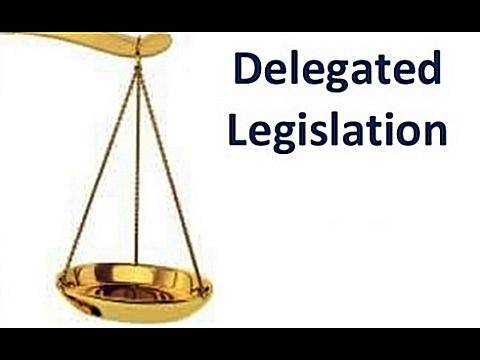DELEGATED LEGISLATION IN INDIA
The primary function of Parliament is to make laws and legislature is empowered to make laws and there exists a further type of legislation knows as delegated legislation under which Parliament passes statutes that set policy and principles and delegates authority to an executive branch official. Delegated legislation is a law made by a person or body other than legislature but within the legislative authority. In the words of Salmond, Delegated legislation would be that which proceeds from any authority other than sovereign power, and is therefore dependent for its continued existence and validity on some superior or some supreme authority. Delegated legislation refers to all law-making that takes place outside the legislature and is expressed as rules, regulations, orders, directions which signifies subordinate, or delegated legislation.
Delegated legislation is an important part of administrative procedures and systems in such a way that any policy, law or rule created by the legislature is always delegated to a certain body. However, this delegation will only be valid when the legislative authority is allowed to do the same. The delegate must work within the power delegated. The delegate cannot further delegate its duty given to it by the authority this is based on Delegatus non-Potest Delegare, which makes sub-delegation unauthorized, unless permitted expressly or by necessary implication by the statute.
what is subordinate legislation
Indian administrative system refers to this as subordinate legislation since it tries to express that the authority making legislation is subordinate to the legislature. Article 312 of the Indian Constitution gives the legislature the power to delegate its duties to other authority and this also includes the formulation of policies and laws.
In the case of Agriculture Marketing Committee vs. Shalimar Chemical Works Ltd., the Supreme Court laid down necessary reasons for the legislature to delegate its duties to the government later Supreme Court again in another St. Johns Training Institute case highlighted the need for delegated legislation. The court focused on its importance by stating its ability to reduce the burden of the legislature, its ability to develop the legal and administrative system of the country.
Subordinate legislation has been understood under two-periods i.e., pre-constitutional and post-constitutional period. The pre-constitutional era can be understood with the help of two case laws- R vs. Burah and Jitender Nath vs. the State of Bihar. In R vs. Burah case, section 8 & 9 of a certain act was challenged on grounds of excessive delegation. The area of Garo hills was removed from civil and criminal jurisdiction and the said section allowed the Lieutenant Governor to extend the said provision to other areas within Garo hills. The High Court of Calcutta held section 9 ultra vires under the principle of Delegatus non potest delegare. They said that legislation cannot further delegate its power and duties. The privy council overturned the judgment and said that only conditional legislation invalid. In Jitender Nath’s case, the court held that there cannot be any other delegated legislation that conditional legislation. All of this created confusion regarding delegated legislation and this confusion was clarified in the post-constitutional period In the Re Delhi Laws Act case. In this case, the court laid down three important tests that must be fulfilled for legislative authority to delegate duties-
- Subject-matter of delegation must be within the scope of the legislative authority.
- The power of delegation must not negate other instruments created by the legislature. (power isn’t ultra-vires)
- It doesn’t create another legislative body having the same duties and functions to do.
The legislature has a wide power of delegation and it is important to have a safeguard and control over the delegation so that these safeguards create balance within administrative system and this power is not used in an uncontrolled manner and these safeguards must be strictly applied and properly regulated for better enactment of laws.
Author: sushma,
Ideal Institute of Management and Technology, 2nd year (BALLB)

